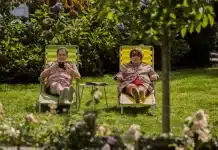Is Night Court Based on a True Story? – American television sitcom Night Court was shown on NBC from January 4, 1984, until May 31, 1992. The scene was the evening session of a Manhattan municipal court presided over by Harold “Harry” T. Stone, a young, unconventional judge (portrayed by Harry Anderson). Reinhold Weege, a comedy writer who had previously worked on Barney Miller in the 1970s and early 1980s, devised the series.
The famous 1980s comedy Night Court will be revived by NBC and will make its channel debut on January 17, 2023. Abby Stone, the daughter of the late Judge Harry Stone, who now sits on her father’s bench in the Manhattan Municipal Court, is the subject of the new television series. The program explores several other odd personalities while highlighting her myriad difficulties in her role as a judge. Some of you want to know whether ‘Night Court’ and its cases are based on true stories. Let’s find out.
Also Like: Who is Rowan Fielding’s Father in ‘Mayfair Witches’?

Is Night Court a True Story?
Yes, ‘Night Court’ is partially based on a true story. The 1984 television series Night Court featured an oddball cast of defendants, bailiffs, and public defenders throughout the late-night hours of a Manhattan municipal court. Judge Harry T. Stone, a jurist with a baby face and insufficient qualifications, presided over this court. Judge Stone presided over a variety of bizarre cases throughout the series, including one having a purportedly “invisible” defendant played by Michael Richards from Seinfeld and another involving an indecent exposure prosecution brought against an entire nudist (or “naturalist”) apartment building.
However, according to Reinhold Weege on the Season 1 DVD commentary for Night Court, the show’s idea was loosely based on an actual Los Angeles incident, despite the apparent absurdity of its premise and Judge Harry T. Stone as a character. The Los Angeles mayor purposefully filled his last remaining court positions with underqualified individuals like Harry Stone in an effort to harm his replacement. Similarly to this, it is revealed in the Night Court pilot episode that Harry only became a judge after the departing New York City mayor desperately booked dozens of last-minute appointments for judges and Harry was the only person on the call list to answer his phone.
The source of Weege’s main character’s motivation was essential to Night Court’s long-term success. Before the show’s conception, Weege reportedly informed then-NBC head Brandon Tartikoff that he would only consider creating a courtroom-based sitcom if he could “come up with an interesting lead character,” according to E2002 ! ‘s documentary TV Tales. Weege believed that Harry Stone’s character development as the star of Night Court was essential to the series’ beginning.
Weege proceeded to draw on other real-life events as he developed the play. The same E! documentary claims that Weege saw a group of New York City night court judges while sitting on the bench and drew inspiration for the characters in Night Court from them as well as from other justices who were said to have peculiar emotional issues. Weege said he was “simply moved by the chaos of New York Manhattan night court” about the enlightening experience.
Real-world experiences have served as inspiration for writers across a range of genres. Nevertheless, few television program have been as heavily influenced by a particular setting as Night Court. The first-hand experience Reinhold Weege had with the reality of a night-shift municipal court, combined with inspiration from a related event in Los Angeles, would fundamentally shape Night Court as a series and lay the groundwork for its success as a long-running sitcom in the future.














